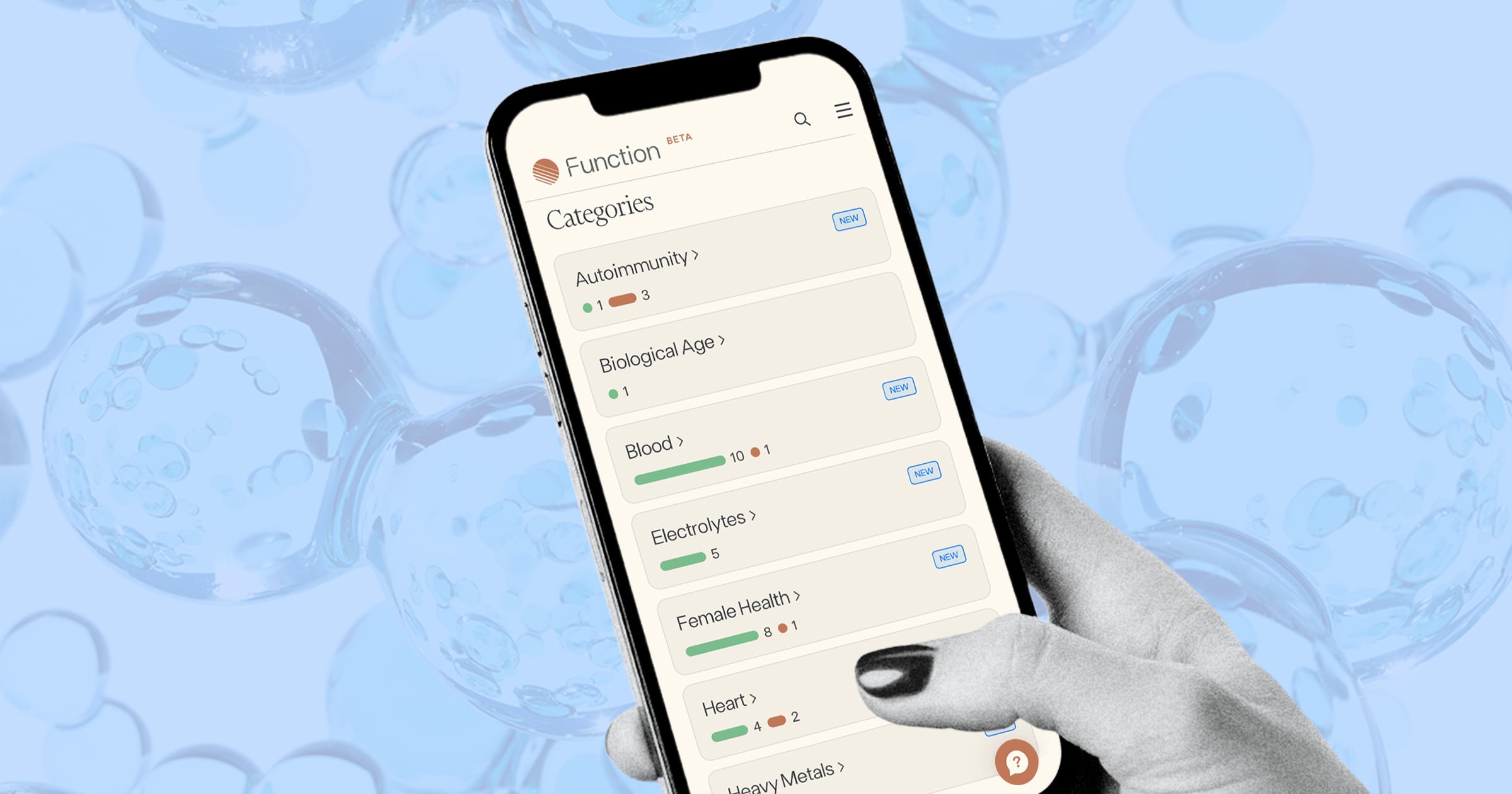As a person with a chronic illness, I’m no stranger to bloodwork. I used to pore over my lab results, googling the various meanings, and trying not to panic when a test fell out of range. Function Health has a different approach. Created by Mark Hyman, MD, Function is intended to help people take control over their own health. While you’ll still wait in line at your local lab and feel the quick prick of the blood draw, Function allows you to skip the doctor’s office and test for over 100 biomarkers, with results and clinician notes delivered within two to three weeks.
“Function is really the first health platform that allows people full access to their own data,” Dr. Hyman says. “[Usually] you have to go through a doctor, insurance companies – you have to ask them for what you want, they may or may not do it, and then you get a limited data set and they don’t really know what to tell you to do about a lot of things.” Function seeks to disrupt this model, acting as a preventative tool to bolster longevity and inform certain lifestyle categories. This may be one of the reasons why Function recently announced its partnership with Equinox Optimize – a $40,000 membership said to help you live longer.
“We wanted to find a partner to match us on our already existing and extremely rigorous testing that allows us to give the best in the industry personal training experience,” explains Julia Klim, Equinox’s VP of strategic partnerships and business development. With the help of Function’s biomarkers, Equinox can then “give a data set about an individual to establish their baseline, and essentially give them the best ever personalized coaching experience across four categories.” These include movement, nutrition, sleep, and recovery.
Known for boutique-style fitness, it’s not entirely surprising that Equinox would choose to inform their services (like coaching and fitness assessments) with even more extensive testing. But given the price tag, it’s worth asking: does Function actually work? And if so, is it worth the out of pocket cost or the expensive gym membership? Here are my thoughts after trying it myself.
Experts Featured in This Article:
Mark Hyman, MD, is the co-founder and chief medical officer of Function and a senior medical advisor at the Cleveland Clinic.
Julia Klim is the vice president of strategic partnerships and business development at Equinox.
My Experience With Function
I went into this testing with all the confidence in the world. As previously mentioned, bloodwork is nothing new for me; at this point, I could tell you the majority of my labs off the top of my head (humble brag). Still, Function managed to surprise me.
After signing up for Function, you’re asked to give a detailed summary of your medical history and current medications, which informs the later clinician notes and recommendations. You’ll then schedule two separate lab tests through Quest Diagnostics. The portal on your Function profile makes it easy to find locations and times near you, and the online concierge can also help you with scheduling. For best results, Function recommends taking the tests in the morning (before 9 a.m.) and within 10 days of one another. You’re also encouraged to fast before testing and cut out any supplements 72 hours prior.
I found testing to be quick and easy, especially considering all the biomarkers you get out of it. My appointment lasted around 15 minutes, and there were approximately six vials of blood drawn in total, plus a urine sample. When I had to reschedule my second lab appointment, Function’s online messaging system helped me find a different date and location, which made the experience relatively painless. After my second round of testing, I anxiously waited for my results.
What I Liked About Function
Knowing that my chronic illness would inevitably make its presence known, I was arguably most worried about my “biological age” – one of the markers people post about the most on social media. I remember seeing incredibly fit 30-year-old friends share their impossibly young biological ages, but I was just hoping for anything under 80. I ended up getting a biological age of 25.1, which is a whole 0.1 years younger than my actual age, but I’ll gladly take it.
Another interesting finding: about a week prior to my second Function test, I had routine bloodwork done for my general practitioner, at which point I learned that my white blood cell count was elevated (sometimes indicative of an infection). I was curious to see if Function would pick up on this too, and it did – specifically identifying inflammation in the urinary tract. I didn’t think much of it in the moment, but I eventually ended up in the hospital with a tubo-ovarian abscess just a few weeks later. Was it a sign to take my Function results more seriously? Possibly. But at the very least, I was grateful for the heads up.
Even with over 100 biomarkers, I didn’t feel overwhelmed by my lab results. They were delivered in an extremely comprehensive way, with detailed descriptions of what the tests are and, more importantly, what your results might mean. I also appreciated the detailed clinician notes (although again, this should not replace an actual doctor’s visit), and personalized action plan complete with foods and supplements that may be beneficial to me, plus a few I may want to cut out. While I knew about many of the findings, from inflammatory markers to anemia, Function put a lot more on my radar, including issues with my kidney and heart health, which I otherwise wouldn’t have thought to track or ask my doctor about.
For instance, my clinician notes identified elevated creatinine levels, which is fairly normal given the medication I’m on, but suggests closer monitoring of my kidney function, which I wouldn’t have known before. While you cannot directly engage with experts through Function, a doctor will call you if there are any emergency results. The clinician notes also give you clear advice, and they explicitly recommended I follow up with a primary care physician and any relevant specialists to discuss red flags (which I appreciated).
What’s Worth Noting
I genuinely enjoyed Function Health and found it informative from both an existing medical and preventative standpoint. That said, having spent three years of my life dealing with an undiagnosed autoimmune condition, it’s important to note that this kind of health testing doesn’t always tell the full story.
Throughout my journey with chronic illness, plenty of people have offered up solutions (with the best intentions, of course), from yoga to dietary supplements. But even treatments confidently pitched to me by actual healthcare providers have failed. Illness is complicated, and while there are things we can do to mitigate that risk (which I do think Function can help with), I want to make it clear that this burden shouldn’t always fall on the patient.
Function is also not a replacement for actual check-ups or doctor visits, although I do think it could help patients advocate for themselves in medical environments, which is a major plus in my book. Function also is not federally approved, meaning it isn’t regulated by the Food and Drug Administration (FDA), which is a potential risk as well.
Who Is Function Best For?
I think Function would be best for those with existing medical conditions looking for a more convenient way to track their health. As it stands now, you can order your own bloodwork through your local lab, but a single panel can cost upwards of $100 out of pocket (depending on the specific tests, location, and insurance). In my experience, these labs are generally harder to understand, and would be more expensive in the long run if you’re looking to monitor your progress. Otherwise, you have to go through your doctor each and every time, which is fine – but often harder to organize on a regular basis.
I would also recommend Function to anyone wanting to quickly identify areas of concern or improvement in your health. Just be sure to follow up with your doctor for more personalized medical advice. “People want to have a sense of what’s happening inside their body,” Dr. Hyman says. “[Function is] a really great way to get people to enter into self-care through a different channel than just going to their doctor’s office.”
Is Function Worth the Splurge?
Function costs $42 per month, but is billed annually at $499 for the standard 106 biomarkers, not counting any additional, more specified tests you decide to tack on. You can check out the full list of lab tests and add-ons here.
While this kind of diagnostic information can absolutely empower people to learn more about their bodies and take control over their own health, I’d imagine that most healthy individuals aren’t spending $499 out of pocket for health testing. That said, if you do have the funds – and those spending upwards of $215 a month on Equinox memberships may be good candidates – I think Function is a powerful, informative, and convenient tool worth the investment. If you have an existing medical history, Function might also be a worthwhile investment to help with tracking and advocacy (and it may actually save you money in the long run).
Additional Details
- Function Membership Pricing: $499 Annually
- Function covers two sets of lab visits per year
- There is currently a waitlist to join Function, which you can access here
- Testing is done at Quest Diagnostics
- Anyone over the age of 18 can participate
- Function does not accept insurance, but it is FSA/HSA eligible
- Results can be shared with your doctor at any time
Rating:
Chandler Plante (she/her) is an assistant health and fitness editor for PS. She has over four years of professional journalism experience, previously working as an editorial assistant for People magazine and contributing to Ladygunn, Millie, and Bustle Digital Group.




